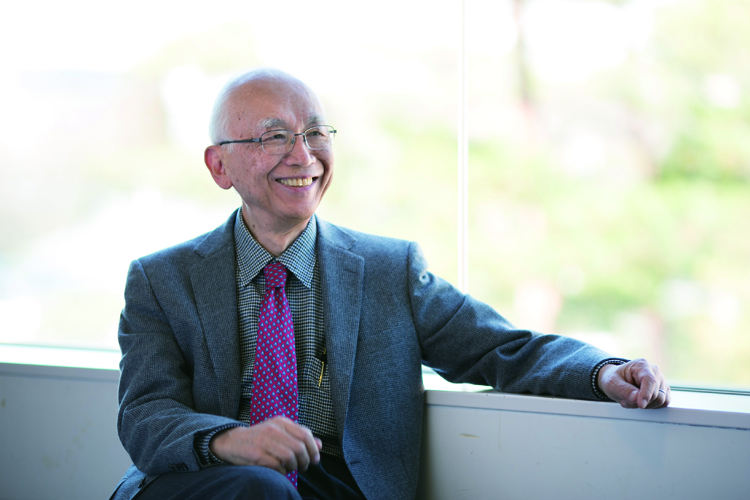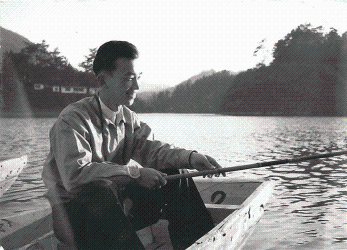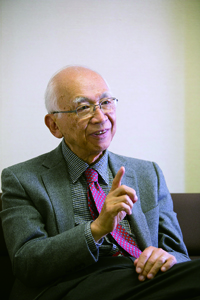- Home
- > Outreach
- > Publications
- > CONVERGENCE
- > LEADER’S VOICE
 LEADER’S VOICE
LEADER’S VOICE
Yoshio Nishi
Contributing to the Future of Humankind with a Sincere Attitude

Making English a common language is essential for internationalization
——Prof. Nishi, how do you see the development of WPI-MANA?
There have been various twists and turns along the way, but overall, MANA has made extraordinary progress. The activities of MANA as such, that is, materials development and leading-edge exploratory research in fields based on that work, have made a very important contribution to scientific progress in nanoscience. MANA has also grown to the level where the results of research in MANA, for example, the atomic switch, can actually be applied to systems like the brain type computer and their potential can be verified. From view point of Stanford University, I also feel that MANA is doing excellent job in terms of of attracting outstanding researchers from Western Europe and the United States, for which making English as a common language was enormously effective.
——Even now, attracting top-flight researchers from other countries
seems to be an important issue in Japan.
After all, the problem of language is a large one. Even looking at my own students, in a world-wide comparison of organizations with excellent research capabilities, what language can be used to complete the necessary communicative procedures for research activities when placed in that position will be an issue. For instance, even when doing trivial matters such as sending purchase order of parts, or making a Shinkansen reservation to attend conference, if English could be used for such occasions, the daily activity would be much easier and smoother for those coming from foreign country.
Frankly speaking, while there is no problems in technical discussions with research colleagues as most people can speak English, there may still exist a number of miscellaneous administrative matters
and support/technical service required, which tend to have been done in Japanese language. If time is lost as a result of such trifling matters, even assuming it's only several days, that will eventually accumulate into a large loss, and will become an obstacle to research activities as a whole. I think it's important to recognize that the barrier of language is far higher than is thought by Japanese who are living in Japan.
There have been various twists and turns along the way, but overall, MANA has made extraordinary progress. The activities of MANA as such, that is, materials development and leading-edge exploratory research in fields based on that work, have made a very important contribution to scientific progress in nanoscience. MANA has also grown to the level where the results of research in MANA, for example, the atomic switch, can actually be applied to systems like the brain type computer and their potential can be verified. From view point of Stanford University, I also feel that MANA is doing excellent job in terms of of attracting outstanding researchers from Western Europe and the United States, for which making English as a common language was enormously effective.
——Even now, attracting top-flight researchers from other countries
seems to be an important issue in Japan.
After all, the problem of language is a large one. Even looking at my own students, in a world-wide comparison of organizations with excellent research capabilities, what language can be used to complete the necessary communicative procedures for research activities when placed in that position will be an issue. For instance, even when doing trivial matters such as sending purchase order of parts, or making a Shinkansen reservation to attend conference, if English could be used for such occasions, the daily activity would be much easier and smoother for those coming from foreign country.
Frankly speaking, while there is no problems in technical discussions with research colleagues as most people can speak English, there may still exist a number of miscellaneous administrative matters
and support/technical service required, which tend to have been done in Japanese language. If time is lost as a result of such trifling matters, even assuming it's only several days, that will eventually accumulate into a large loss, and will become an obstacle to research activities as a whole. I think it's important to recognize that the barrier of language is far higher than is thought by Japanese who are living in Japan.
Contributing to society through materials research
——It has now been 28 years since you moved to America. Can you tell us about your own work?
Because there is no mandatory retirement system in America, I'm on 100% active duty all along. I currently have 11 doctoral students in my lab, and I'm engaged in discussion with them year-round, while also teaching at the same time. Always striking a balance between research and teaching is an
article of faith with me.
For the past several years, I've been grappling with the development of nonvolatile resistance change memory. Among the transition metal oxides, for instance, the stoichiometry sometimes fails, and oxygen vacancies form. If that happens, the electron clouds in the surrounding metal atoms will
mutually intersect, and their oxides, which were intrinsically insulators, will pass electricity.
In my research, I investigate that behavior by theoretical calculations and confirm experimentally whether that actually occurs.
While I was at Toshiba, I also wrestled with the problem of the work of this system, that is, what happens when two different substances are in contact to each other. Using electron spin resonance absorption measurements, I was the first in the world to discover the phenomenon in which oxygen
vacancies form in silicon MOS transistors at the interface between silicon and the silicon oxide, leaving Si dangling bond, and electrons are trapped in those vacancies. Study of the behavior of such dangling bonds of atoms, followed by behavior of electrons, you might say, is something that seems to be my life's work.
——Could you describe the future of your own research, and its relation to society?
Serious relation is the accumulation of various data that humankind needs. In big data, data central and the like, which are frequent topics, basically, most of the data are stored in huge amount of conventional electronic charge storage-type memories, such as flash memory, but this type of memory is already approaching to its limit. However, if it was possible to build a system that can utilize
new phenomenon where electrical conductivity changes by applying programming voltage i.e. "1" or "0", in nanoscale, it would realize non-volatile resistive switching memory which has a high speed programming and reading, with an order of magnitude smaller power consumption.
Environmental information from every part of the world will be detected by sensors, and the data acquired by those sensors will be accumulated. If such a system can be created, we can advance to a stage where the collected data are widely useful for us humans. Examples include monitoring and accumulation of long-term weather information, environmental information both nature made and human made, medical data and the like.
Because there is no mandatory retirement system in America, I'm on 100% active duty all along. I currently have 11 doctoral students in my lab, and I'm engaged in discussion with them year-round, while also teaching at the same time. Always striking a balance between research and teaching is an
article of faith with me.
For the past several years, I've been grappling with the development of nonvolatile resistance change memory. Among the transition metal oxides, for instance, the stoichiometry sometimes fails, and oxygen vacancies form. If that happens, the electron clouds in the surrounding metal atoms will
mutually intersect, and their oxides, which were intrinsically insulators, will pass electricity.
In my research, I investigate that behavior by theoretical calculations and confirm experimentally whether that actually occurs.
While I was at Toshiba, I also wrestled with the problem of the work of this system, that is, what happens when two different substances are in contact to each other. Using electron spin resonance absorption measurements, I was the first in the world to discover the phenomenon in which oxygen
vacancies form in silicon MOS transistors at the interface between silicon and the silicon oxide, leaving Si dangling bond, and electrons are trapped in those vacancies. Study of the behavior of such dangling bonds of atoms, followed by behavior of electrons, you might say, is something that seems to be my life's work.
——Could you describe the future of your own research, and its relation to society?
Serious relation is the accumulation of various data that humankind needs. In big data, data central and the like, which are frequent topics, basically, most of the data are stored in huge amount of conventional electronic charge storage-type memories, such as flash memory, but this type of memory is already approaching to its limit. However, if it was possible to build a system that can utilize
new phenomenon where electrical conductivity changes by applying programming voltage i.e. "1" or "0", in nanoscale, it would realize non-volatile resistive switching memory which has a high speed programming and reading, with an order of magnitude smaller power consumption.
Environmental information from every part of the world will be detected by sensors, and the data acquired by those sensors will be accumulated. If such a system can be created, we can advance to a stage where the collected data are widely useful for us humans. Examples include monitoring and accumulation of long-term weather information, environmental information both nature made and human made, medical data and the like.
"Human integrity" and "teamwork".
——Could you discuss the strengths of human resources development at Stanford University?
In Japan, there seem to be quite high barriers against collaboration and communication between individual researchers or between laboratories, but in America, and particularly at Stanford University, there's virtually nothing like that. For example, students of other professors are welcome in discussions in the inner circle of our laboratory; the opposite is also true, and there's absolutely no need to ask me for permission.
Although each student in the doctoral course has a total of three research advisors, it's not necessary to select those people from the same department, or even from the same university. When a student wants to expand his or her knowledge while doing research, that student just visits people who are doing a good job in that field and requests guidance. A PhD is not a mere specialist trapped in the narrow confines of his or her work, but possesses adequate horizontal breadth . . . We are mindful of that kind of teaching, and students actually receive that kind of education.
For that reason, I feel that it is extremely good that you also have that kind of environment
at MANA, and you have horizontal collaboration, so that, for example, when somebody wants to do research with someone at NIMS who isn't affiliated with MANA, or with someone from another university, they can throw themselves into it, without asking the permission of their superior in each individual case.
——What things are you aware of for developing outstanding young
people in that manner?
I communicate that fact that, while they're at university, their research is basically individual work, but there are different standards of value proposition in the real world. Perhaps nobody questions your research ability, but what they do ask, first of all, is that do you have high level of human integrity or not? And equally important, is that are you willing to work in a team or not? Sometimes there are people who have graduated from top class universities, but for that reason, they simply can't display an attitude of doing things together with others.
The case of people who would join company, but become university professors, the situation would be the same. When a student is looking for work, prospective employers ask me for a reference, but the ultimate questions that I'm asked at that time are, after all, the two things I just mentioned, i.e. human integrity and the willingness to work in a team. This is simply reflecting complexity of today's science and engineering in which progress can be sizable only having a number of brains collaboration together with mutual trust.
In Japan, there seem to be quite high barriers against collaboration and communication between individual researchers or between laboratories, but in America, and particularly at Stanford University, there's virtually nothing like that. For example, students of other professors are welcome in discussions in the inner circle of our laboratory; the opposite is also true, and there's absolutely no need to ask me for permission.
Although each student in the doctoral course has a total of three research advisors, it's not necessary to select those people from the same department, or even from the same university. When a student wants to expand his or her knowledge while doing research, that student just visits people who are doing a good job in that field and requests guidance. A PhD is not a mere specialist trapped in the narrow confines of his or her work, but possesses adequate horizontal breadth . . . We are mindful of that kind of teaching, and students actually receive that kind of education.
For that reason, I feel that it is extremely good that you also have that kind of environment
at MANA, and you have horizontal collaboration, so that, for example, when somebody wants to do research with someone at NIMS who isn't affiliated with MANA, or with someone from another university, they can throw themselves into it, without asking the permission of their superior in each individual case.
——What things are you aware of for developing outstanding young
people in that manner?
I communicate that fact that, while they're at university, their research is basically individual work, but there are different standards of value proposition in the real world. Perhaps nobody questions your research ability, but what they do ask, first of all, is that do you have high level of human integrity or not? And equally important, is that are you willing to work in a team or not? Sometimes there are people who have graduated from top class universities, but for that reason, they simply can't display an attitude of doing things together with others.
The case of people who would join company, but become university professors, the situation would be the same. When a student is looking for work, prospective employers ask me for a reference, but the ultimate questions that I'm asked at that time are, after all, the two things I just mentioned, i.e. human integrity and the willingness to work in a team. This is simply reflecting complexity of today's science and engineering in which progress can be sizable only having a number of brains collaboration together with mutual trust.
Researchers who follow an honor code will create the future.
——Finally, how do you see the direction of nanotechnology research
in the future? Will nanotechnology lead humankind in a good direction?
in the future? Will nanotechnology lead humankind in a good direction?

Prof. Nishi in his young days
First and foremost, we need to think how individual research studies can contribute to the future society. Though each researcher should think this theme individually, it is also necessary for MANA to be able to express that viewpoint more clearly. When looking at the research that you're doing from the macro scopic perspective, the question you should ask would be what kind of impact it may
create in its magnitude and also time scale. In that, for example, if the future development looks unfortunately undesirable, making a judgment to stop with good grace, and going on to the next project, is not necessarily the job of the research manager, but should be done by the researcher him/herself. It is important for individual researcher by considering various criteria for deciding your fate by yourself, I think.
Generally speaking, I believe, nanotechnology can surely contribute to humankind. For example, in the field of medicine, the environmental and energy field. However, unlike the pure sciences, how we use nanotechnology is a problem. But while opinions may differ depending on the person, it is my
conviction that, fundamentally, our society must be inherently good. In Europe and America, there is a cultural climate that highly evaluates the attitude that people should always act in the light of their own morality or pride, which we refer to as following an "honor code". In that sense, I truly want to base my actions on the belief that all people are inherently good, and I want to consider
how that aspiration can contribute to society in the future of science and technology. The future of humankind is definitely not something that we can leave to others.
create in its magnitude and also time scale. In that, for example, if the future development looks unfortunately undesirable, making a judgment to stop with good grace, and going on to the next project, is not necessarily the job of the research manager, but should be done by the researcher him/herself. It is important for individual researcher by considering various criteria for deciding your fate by yourself, I think.
Generally speaking, I believe, nanotechnology can surely contribute to humankind. For example, in the field of medicine, the environmental and energy field. However, unlike the pure sciences, how we use nanotechnology is a problem. But while opinions may differ depending on the person, it is my
conviction that, fundamentally, our society must be inherently good. In Europe and America, there is a cultural climate that highly evaluates the attitude that people should always act in the light of their own morality or pride, which we refer to as following an "honor code". In that sense, I truly want to base my actions on the belief that all people are inherently good, and I want to consider
how that aspiration can contribute to society in the future of science and technology. The future of humankind is definitely not something that we can leave to others.

Yoshio Nishi
Professor of electrical engineering, Stanford University
Professor of electrical engineering, Stanford University
Prof. Nishi received a PhD from the University of Tokyo, and in 1962 he joined Toshiba R&D working mainly on Si based CMOS devices and technology. In 1986 he joined Hewlett-Packard, and in 1995 he moved to Texas Instruments Inc, as Senior Vice President and Director of R&D. In 2002 he switched from industry to academia as a faculty member of Stanford University. His specialty is physics and engineering of semiconductor devices. He is IEEE Fellow from 1987, and received numerous awards, including 2002 Robert Noyce Medal. He also serves as an Evaluation Committee member of MANA.

